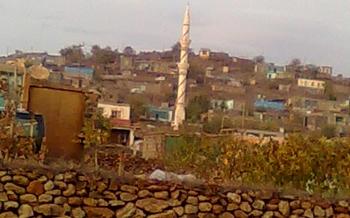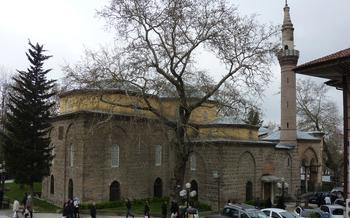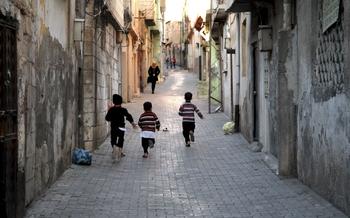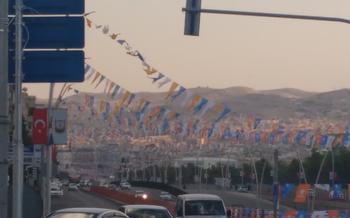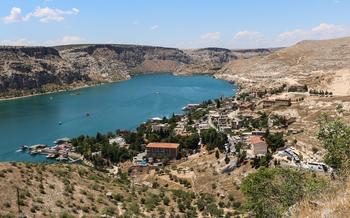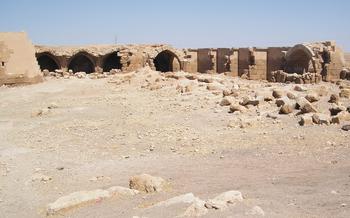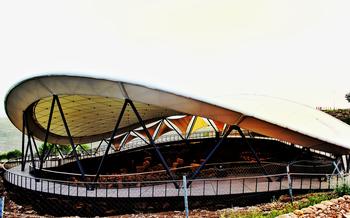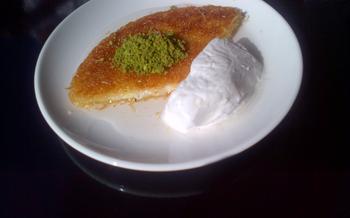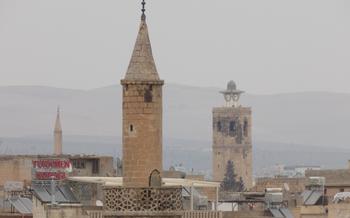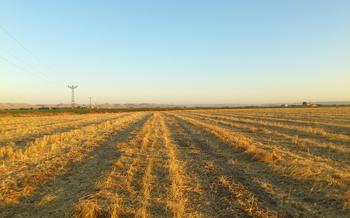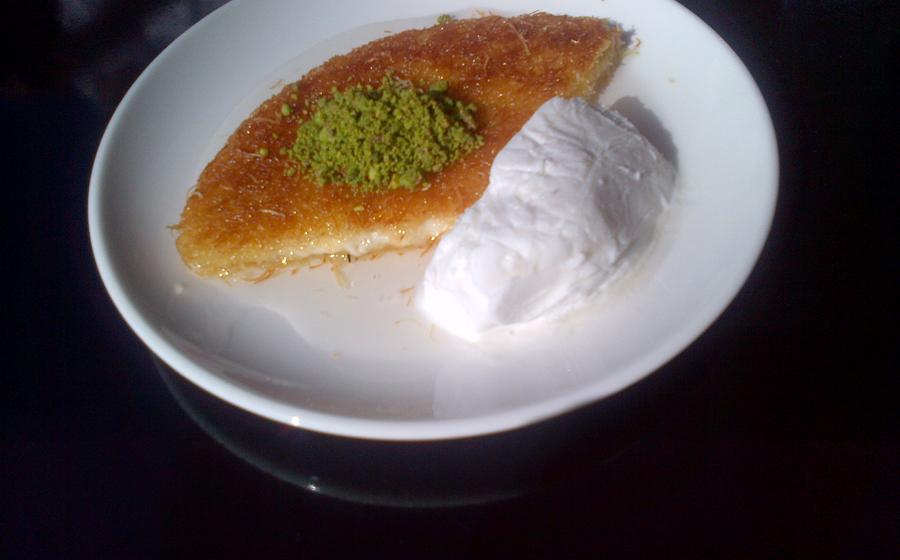
Urfa Traditional Turkish Houses
- History of Urfa Traditional Turkish Houses
- Preservation Efforts
- Architectural Features
- Courtyards and Gardens: Oasis Within Urban Landscape
- Interior Design
- Crafts and Handicrafts
- Local Cuisine
- Cultural Events: Preserving Local Traditions
- Local Hospitality:
- Accessibility
- Photography Opportunities
- Shopping and Souvenirs: Preserving Cultural Heritage through Local Artisans
- Tours and Guides
- Cost and Budgeting
- Insider Tip:
History of Urfa Traditional Turkish Houses
Urfa Traditional Turkish Houses, with their rich history and architectural significance, stand as a testament to the cultural heritage of Şanlıurfa. These houses, built primarily in the 19th and early 20th centuries, reflect the unique blend of traditional and modern architectural styles that characterize the region. Constructed using local materials like basalt and limestone, they feature distinctive elements such as the "eyvan" (veranda) and intricate stone carvings. Initially serving as residences, workshops, and even religious spaces, these houses have undergone a remarkable transformation, evolving into cultural landmarks and tourist attractions due to their historical and architectural value.
Preservation Efforts
Recognizing the historical and cultural significance of Urfa Traditional Turkish Houses, various initiatives are underway to preserve and restore these architectural treasures. Local authorities, in collaboration with cultural organizations and restoration experts, are actively involved in this endeavor. The preservation efforts aim to protect the structural integrity of these houses, conserve their unique architectural features, and ensure their longevity for future generations.
Challenges in preserving these structures include urban development pressures, neglect due to changing lifestyles, and the need for sustainable funding. Restoration projects often involve a delicate balance between maintaining the authenticity of the houses and incorporating modern amenities to meet the needs of contemporary living.
The success of preservation efforts has led to the revitalization of neighborhoods surrounding these traditional houses. The restored structures have attracted visitors, creating a vibrant cultural tourism scene. This, in turn, has generated economic benefits for the local community and stimulated interest in preserving other historical landmarks in the region.
Architectural Features
Urfa Traditional Turkish Houses are renowned for their striking architectural features, which harmoniously blend traditional and modern elements. The facades of these houses are adorned with intricate stone carvings, decorative arches, and vibrant tilework, showcasing the region's rich artistic heritage. These intricate details add depth and character to the houses, making them stand out from the surrounding cityscape. The interiors are equally impressive, featuring hand-crafted woodwork, colorful textiles, and unique decorative elements that reflect the daily life and customs of the local people.
One of the distinctive features of these houses is the incorporation of sustainable design elements. Courtyards are a common feature, providing natural ventilation and temperature regulation, creating a comfortable and cool indoor environment. Wind towers, strategically positioned to capture prevailing breezes, further enhance air circulation and reduce the need for air conditioning. These sustainable features demonstrate the ingenuity of the traditional builders and their understanding of the local climate.
The integration of courtyards and wind towers not only enhances the functionality of the houses but also contributes to their aesthetic appeal. The courtyards, often adorned with lush greenery and water features, provide a tranquil oasis within the bustling urban landscape. The wind towers, with their elegant shapes and decorative elements, add a touch of architectural interest to the rooftops, making them a distinctive feature of the Şanlıurfa skyline.
Courtyards and Gardens: Oasis Within Urban Landscape
The harmonious union of indoor and outdoor spaces is a defining characteristic of Urfa Traditional Turkish Houses. These houses often feature charming courtyards and gardens that serve as tranquil oases amidst the vibrant urban landscape. These courtyards, with their lush greenery and colorful flowers, provide a sense of serenity and privacy for families and communities.
The courtyards are designed to facilitate social interactions and foster a sense of togetherness. Families gather in these outdoor spaces to share meals, relax, and entertain guests. The courtyards also serve as venues for traditional ceremonies and celebrations, such as weddings and religious festivals.
The gardens within these houses are a testament to the region's rich flora and fauna. Visitors can admire vibrant flowers, swaying trees, and aromatic herbs that fill the air with their sweet fragrances. The presence of water features, such as fountains and pools, adds a touch of tranquility and coolness to the atmosphere.
These courtyards and gardens are not just aesthetic elements; they also play a functional role in the sustainability of the houses. The courtyards provide natural ventilation and temperature regulation, reducing the need for artificial cooling and heating systems. The gardens contribute to the overall ecological balance by attracting birds, butterflies, and other beneficial insects.
Exploring the courtyards and gardens of Urfa Traditional Turkish Houses is a delightful experience that offers visitors a glimpse into the harmonious relationship between nature and architecture, as well as the traditional lifestyle of the local people.
Interior Design
The interiors of Urfa Traditional Turkish Houses exude a sense of authenticity and cultural significance. Hand-woven rugs adorn the floors, adding warmth and comfort to the living spaces. Intricate woodwork, often featuring geometric patterns and floral motifs, decorates walls and ceilings, showcasing the craftsmanship of local artisans. Colorful textiles, such as embroidered cushions and curtains, add a touch of vibrancy to the rooms.
The furniture is arranged in a way that reflects the daily life and customs of the local people. Low seating arrangements, such as divans and ottomans, encourage a relaxed and intimate atmosphere. Traditional Turkish coffee tables, known as "sinis," are placed in the center of the rooms, serving as a gathering spot for family and friends.
While these houses have been restored and modernized to provide contemporary comforts, great care has been taken to preserve their historical character. Modern amenities, such as air conditioning and heating systems, have been integrated seamlessly into the traditional design, ensuring the comfort of guests without compromising the authenticity of the houses.
Crafts and Handicrafts
Urfa Traditional Turkish Houses are not just architectural marvels but also hubs of vibrant crafts and handicrafts. These houses showcase the region's rich artistic heritage, with local artisans practicing traditional crafts using locally sourced materials. Visitors can witness the intricate skills of weaving, pottery, and metalworking as artisans create beautiful handmade items. These crafts not only serve as a source of income but also play a vital role in preserving cultural traditions and passing down skills from generation to generation. Visitors have the opportunity to learn about these crafts, watch artisans at work, and purchase unique handcrafted items as souvenirs, supporting local artisans and contributing to the preservation of traditional techniques.
Local Cuisine
Şanlıurfa is renowned for its rich and flavorful cuisine, and Urfa Traditional Turkish Houses offer a unique opportunity to experience the region's culinary delights. These houses often feature traditional kitchens, where visitors can witness the preparation of authentic dishes using fresh, locally sourced ingredients. The menu typically includes an array of grilled meats, such as the famous "Urfa kebabı" (grilled meat skewers), as well as vegetarian options like "lahmacun" (Turkish pizza) and "künefe" (sweet pastry filled with cheese). Visitors can savor these delicacies in the tranquil courtyards of the houses, immersing themselves in the local culture and flavors.
Cultural Events: Preserving Local Traditions
Urfa Traditional Turkish Houses serve as vibrant venues for various cultural events and festivals, showcasing the region's rich heritage and traditions. These events are not just performances; they are celebrations of identity and community. Visitors can immerse themselves in the enchanting melodies of traditional music, witness the graceful movements of local dances, and experience the artistry of skilled craftsmen demonstrating their techniques.
Food festivals are a highlight, where visitors can savor the diverse flavors of Şanlıurfa's cuisine, from savory kebabs to sweet pastries. These events offer a unique opportunity to connect with the local people, learn about their customs, and share in their joy.
Don't miss the chance to attend one of these cultural events during your visit. Check local listings or ask your tour guide for recommendations. Immerse yourself in the vibrant atmosphere, engage with the friendly locals, and create lasting memories of your time in Urfa Traditional Turkish Houses.
Local Hospitality:
The people of Şanlıurfa are renowned for their warm and welcoming hospitality, creating a memorable experience for visitors to Urfa Traditional Turkish Houses. Hospitality holds a significant place in Turkish culture, and it is reflected in the interactions with guests. Locals are eager to share their stories, traditions, and customs, fostering a sense of cultural exchange. Visitors are welcomed with open arms and treated as honored guests. Engaging with the local community is highly recommended, whether through participating in cooking classes, visiting local markets, or simply striking up conversations with the friendly residents. The genuine hospitality experienced in these traditional houses adds a personal touch to the visit, creating lasting memories and a deeper understanding of the local culture.
Accessibility
Urfa Traditional Turkish Houses are committed to ensuring that everyone can enjoy and appreciate their cultural heritage. The houses have been carefully adapted to accommodate visitors with disabilities, making them accessible to all. Ramps and elevators have been installed to allow wheelchair users to navigate the houses with ease. Accessible restrooms are also available, ensuring that everyone can comfortably visit these historic structures. The staff at the houses is trained to assist visitors with disabilities, providing any necessary support or information. By creating an inclusive environment, Urfa Traditional Turkish Houses welcome visitors of all abilities to immerse themselves in the rich culture and history of Şanlıurfa.
Photography Opportunities
The Urfa Traditional Turkish Houses are a photographer's paradise, offering a wealth of stunning photo opportunities that capture the essence of their architectural beauty and cultural significance. The intricate stone carvings, colorful tilework, and decorative arches provide a vibrant backdrop for capturing the spirit of these historic structures.
The best time to photograph these houses is during the early morning or late afternoon, when the warm, golden light casts long shadows and accentuates their architectural details. The courtyards and gardens, with their lush greenery and vibrant flowers, offer a serene and picturesque setting for capturing the tranquility of these traditional homes.
When taking photographs, it is important to be respectful of the privacy of the residents. While capturing the beauty of these houses is encouraged, it is essential to avoid intruding on the privacy of those who live there.
Some of the best spots for photography within the houses include the intricately carved doorways, the spacious courtyards, and the rooftop terraces, which offer panoramic views of the city and the surrounding landscape.
By capturing the essence of these traditional houses through photography, visitors can take home a piece of Şanlıurfa's rich cultural heritage and share the beauty of these architectural treasures with others.
Shopping and Souvenirs: Preserving Cultural Heritage through Local Artisans
Urfa Traditional Turkish Houses are surrounded by a vibrant shopping scene that offers visitors a chance to take home a piece of the region's rich cultural heritage. From traditional handicrafts to colorful textiles and unique souvenirs, the shops and stalls near these houses are a treasure trove for those seeking authentic local products.
One of the highlights of shopping in this area is the opportunity to support local artisans who keep traditional crafts alive. From intricate pottery and hand-woven rugs to finely crafted metalwork and jewelry, these artisans pour their heart and soul into creating unique pieces that reflect the region's cultural identity. By purchasing their products, visitors not only take home a beautiful souvenir but also contribute to preserving these valuable traditions.
Several shops and markets are known for their exceptional selection of traditional handicrafts. The Grand Bazaar, located in the heart of the city, is a bustling marketplace where visitors can find a wide variety of goods, including handmade textiles, ceramics, and jewelry. The Old City Market, with its narrow cobblestone streets and hidden courtyards, offers a more intimate shopping experience, with small shops selling unique and authentic items.
When shopping for souvenirs, it's essential to take the time to appreciate the craftsmanship and stories behind each piece. Engaging with the artisans and learning about their techniques and inspirations can make the shopping experience even more rewarding. By supporting local artisans and purchasing their products, visitors not only contribute to the preservation of traditional crafts but also create a connection with the local community and its rich cultural heritage.
Tours and Guides
Enrich your experience at Urfa Traditional Turkish Houses by joining a guided tour. Knowledgeable guides will lead you through these architectural wonders, sharing captivating stories and anecdotes about their history, architecture, and cultural significance. Choose from a variety of tour options, including group tours for a social experience, private tours for a personalized touch, or self-guided tours using audio guides or mobile apps for a flexible exploration at your own pace. Look for tour operators or guides who are passionate about sharing the history of these traditional houses and who can provide insights that bring the past to life.
Cost and Budgeting
Visiting Urfa Traditional Turkish Houses is generally affordable, with entrance fees ranging from free to a nominal fee for some houses. Guided tours typically cost around 50-100 Turkish Lira (TRY) and offer a more in-depth experience. Workshops and special events may have additional charges, but they provide a unique opportunity to learn about traditional crafts and customs.
To save money, consider visiting during the off-season (November to March) when there are fewer tourists and prices may be lower. Look out for package deals that include accommodation and tours, which can offer significant discounts.
Remember to carry Turkish Lira for entrance fees and small purchases, as credit cards may not be widely accepted in all shops and cafes.
Insider Tip:
For an unforgettable experience, venture into the heart of Urfa Traditional Turkish Houses and discover the hidden gem of "Gülhane Kahvesi." This charming café, tucked away in a secluded courtyard, offers a tranquil haven where you can sip on traditional Turkish coffee, savor the flavors of homemade pastries, and immerse yourself in the local culture. As you relax in this tranquil setting, engage in conversations with the friendly locals and learn about their traditions, customs, and stories. Gülhane Kahvesi is the perfect place to escape the hustle and bustle of the city and embrace the authentic charm of Şanlıurfa.
